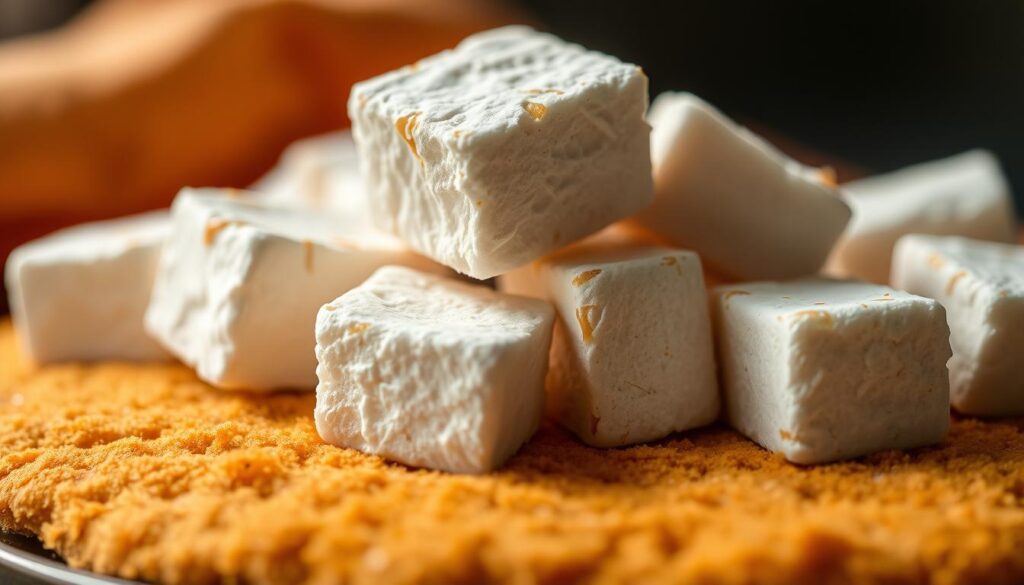Imagine turning a classic treat into a golden delight, full of Vermont’s sweetest treasure. Maple syrup marshmallows are a culinary innovation that brings new flavors to the traditional marshmallow. They offer a rich taste that dances on your tongue.
These special marshmallows mix old confectionery ways with pure maple syrup’s natural sweetness. Each soft bite brings a unique flavor, connecting you to sugarmakers through generations. They’ve mastered the art of maple syrup.
Making maple syrup marshmallows is more than just a sweet treat. It’s about joining a tradition from North America’s maple forests. Their smooth texture and maple flavors turn simple moments into unforgettable culinary adventures.
Both professional bakers and home cooks love adding maple syrup to marshmallow recipes. Maple syrup’s natural complexity gives them depth and character, unlike refined sugar. Enjoy them at a special event or as a personal treat for an exceptional taste journey.
In this guide, you’ll learn to make amazing maple syrup marshmallows that wow everyone. You’ll pick the right maple syrup grade and master marshmallow making. Your cooking skills will soar to new levels.
The Magic of Maple Syrup in Homemade Confections
Making homemade marshmallows with maple syrup turns a simple treat into a masterpiece. The deep flavor of pure maple syrup makes these confections special. They go from basic snacks to gourmet delights that excite your taste buds.
Maple syrup adds something special to sweets. Its natural sweetness is richer and more complex than sugar. This is why sugarmakers focus on quality to improve taste and texture.
- Natural sweetness with complex flavor profile
- Rich amber color that enhances visual appeal
- Unique mineral content from pure maple sap
“Maple syrup is not just a sweetener, it’s a flavor experience that connects us to traditional culinary craftsmanship.” – Artisan Confectioner
Both professional bakers and home cooks love maple syrup in sweets. The subtle caramel undertones and woodland essence make regular marshmallows into something special. They tell a story of natural ingredients and hard work.
Choosing the right maple syrup is key for homemade marshmallows. Dark-grade maple syrup gives the most intense flavor. This makes your treats unforgettable.
Essential Ingredients for Perfect Maple Syrup Marshmallows
To make delicious maple marshmallows, you need the right ingredients and careful steps. Knowing what to use will help you make marshmallows that taste amazing and look professional.
Choosing the Right Grade of Maple Syrup
The quality of maple syrup is key to the taste of your marshmallows. Sugarmakers suggest using Grade A Dark Color syrup for the best flavor. This syrup gives a deep, rich maple taste that makes your marshmallows special.
- Grade A Golden Color: Mild maple flavor
- Grade A Amber Color: Medium maple flavor
- Grade A Dark Color: Strong maple flavor
- Grade A Very Dark Color: Intense maple flavor
Gelatin and Other Key Components
Gelatin is the main ingredient that holds your marshmallows together. Use unflavored powdered gelatin for the right texture. Other important ingredients include:
| Ingredient | Purpose | Recommended Type |
|---|---|---|
| Granulated Sugar | Sweetness and Structure | Pure Cane Sugar |
| Corn Syrup | Prevent Sugar Crystallization | Light Corn Syrup |
| Vanilla Extract | Flavor Enhancement | Pure Madagascar Vanilla |
Tools and Equipment Needed
For making maple marshmallows, you need certain tools. A candy thermometer, stand mixer, and a big baking pan are essential for great results.
- Candy Thermometer
- Stand Mixer with Whisk Attachment
- 9×13 Inch Baking Pan
- Silicone Spatula
- Powdered Sugar for Dusting
Understanding the Science Behind Marshmallow Making
Making homemade marshmallows with maple syrup is a science. It turns simple ingredients into a tasty treat. The process mixes chemistry and cooking skills, making the marshmallows soft and flavorful.
Marshmallow making relies on three key scientific steps:
- Sugar Crystallization: Maple syrup’s molecules stop sugar crystals from forming
- Protein Denaturation: Gelatin proteins change shape, making the marshmallow soft
- Air Incorporation: Whipping adds air bubbles, making the marshmallow light and fluffy
Temperature control is key when making maple syrup marshmallows. Heating the syrup to certain temperatures changes its molecules. This ensures the marshmallows are just right.
| Scientific Process | Temperature Range | Outcome |
|---|---|---|
| Sugar Syrup Heating | 235-240°F | Soft Ball Stage |
| Gelatin Activation | 100-110°F | Optimal Protein Unfolding |
| Whipping | 90-100°F | Maximum Air Incorporation |
Knowing these science facts makes making marshmallows with maple syrup more than just a recipe. It’s a journey into the world of molecular cooking.
Step-by-Step Guide to Making Maple Marshmallows
Making homemade maple marshmallows is a fun journey. It turns simple ingredients into a tasty treat. You’ll need patience, precision, and some key techniques to make these sweet marshmallows.
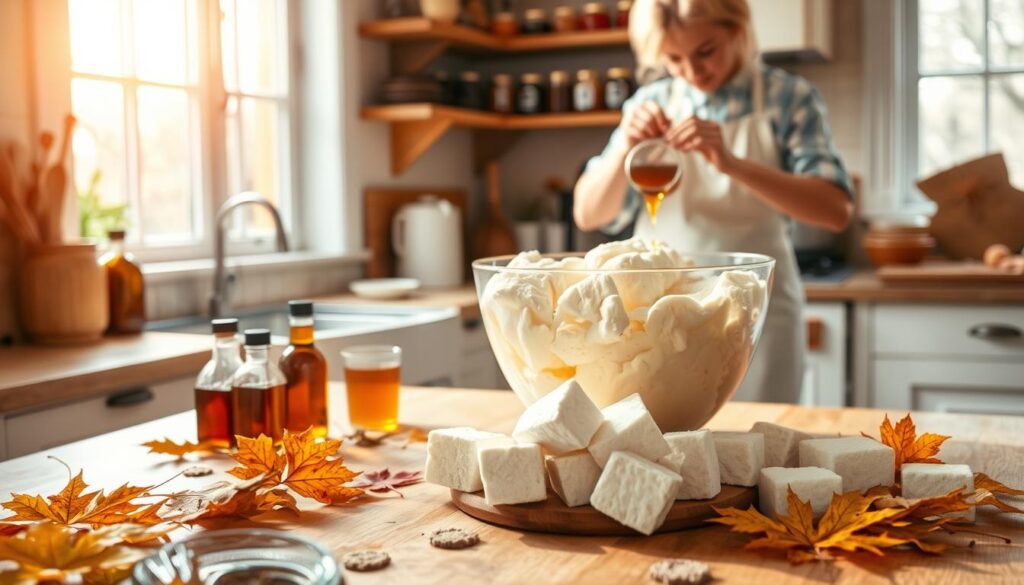
Getting your workspace ready is key for making maple marshmallows. A clean, organized kitchen is the first step to making perfect treats.
Workspace Preparation Essentials
- Clean all surfaces thoroughly
- Gather necessary equipment in advance
- Measure ingredients precisely
- Ensure proper ventilation
Mixing and Temperature Control
When making maple marshmallows, watch your temperature and mixing closely. Use a candy thermometer to check the sugar syrup’s temperature.
- Combine maple syrup and sugar in a heavy-bottomed pot
- Heat slowly to 240°F (soft-ball stage)
- Whip gelatin mixture until light and fluffy
- Gradually add hot syrup while mixing
Setting and Cutting Techniques
The last steps of making maple syrup marshmallows need care and planning. Spread the mixture evenly in a pan and let it set completely.
- Use powdered sugar to prevent sticking
- Allow marshmallows to set for 4-6 hours
- Use a sharp, oil-coated knife for cutting
- Create uniform squares or shapes
Pro tip: Dust your cutting surface with powdered sugar to prevent maple marshmallows from becoming too sticky during the cutting process.
Tips for Achieving the Perfect Texture
Making homemade marshmallows with maple syrup needs care and focus. The texture of these marshmallows is key to a great treat. Experts say making perfect marshmallows is a mix of science and cooking skills.
Several important factors help make maple syrup marshmallows stand out:
- Precise sugar temperature control
- Optimal whipping duration
- Careful gelatin activation
- Proper cooling techniques
Temperature is very important for marshmallow texture. Sugarmakers suggest using a candy thermometer to get the maple syrup to 240°F (soft-ball stage). This exact temperature ensures the right sugar mix and marshmallow structure.
| Texture Factor | Recommended Technique | Impact on Marshmallows |
|---|---|---|
| Whipping Time | 10-12 minutes | Creates light, airy structure |
| Maple Syrup Quality | Grade A Dark Color | Enhances flavor and smoothness |
| Cooling Process | Room temperature, uncovered | Prevents moisture buildup |
“The secret to perfect maple syrup marshmallows is patience and precision in every step.” – Artisan Confectioner
Fixing texture problems means knowing common issues. Marshmallows that are too soft might not have been whipped enough. Marshmallows that are too hard could have been cooked too long. Try making small batches to get the hang of making soft, fluffy maple syrup marshmallows.
Common Mistakes to Avoid When Making Maple Syrup Treats
Making tasty maple syrup treats needs focus and detail. Many home bakers face issues that can ruin the taste and quality of their creations.
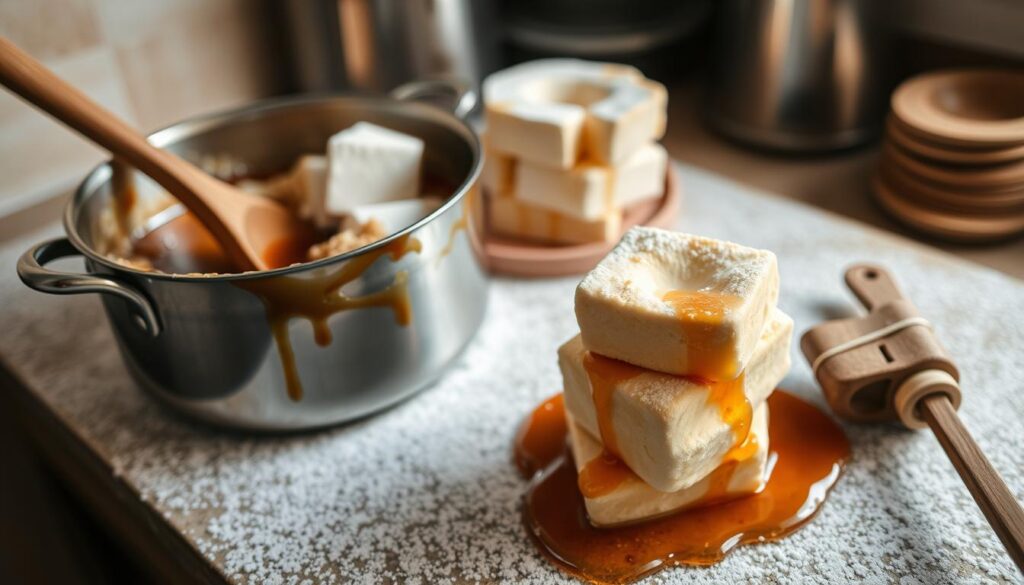
To make great maple syrup treats, you must know the common mistakes. These mistakes can mess up your maple syrup baking skills. By avoiding these errors, you’ll make treats that are both tasty and consistent.
Temperature Control Challenges
Temperature is very important in making maple syrup treats. If you don’t control the heat right, you might face big problems:
- Inconsistent sugar crystallization
- Uneven texture in marshmallows
- Burnt or caramelized sugar
Ingredient Ratio Complications
When you’re making maple syrup recipes, getting the right mix is key. If you get the ingredients wrong, you might end up with:
- Dense or overly wet marshmallows
- Imbalanced flavor profiles
- Structural integrity problems
Storage and Preservation Errors
Storing your maple syrup treats right is important to keep them fresh. Here are some common mistakes to avoid:
- Exposing marshmallows to humidity
- Improper container selection
- Incorrect temperature storage
Knowing these common problems will help you make perfect maple syrup treats. They’ll be a hit with your family and friends.
Creative Ways to Serve Maple Marshmallows
Maple syrup marshmallows turn simple desserts into amazing culinary adventures. They add a rich, sweet flavor to many dishes. This makes them more than just a dessert.
- Hot Beverage Enhancements
- Melt into hot chocolate for a luxurious maple twist
- Float atop warm apple cider for a decadent autumn treat
- Garnish coffee with chopped maple marshmallow pieces
- Dessert Transformations
- Create s’mores with maple marshmallows and dark chocolate
- Crumble over ice cream as a unique topping
- Use as a filling for sandwich cookies
Maple syrup treats can be truly special when you think outside the box. Chefs and home cooks are finding new ways to use these marshmallows. They add a unique twist to both sweet and savory dishes.
“Maple marshmallows are not just a confection, they’re a culinary adventure waiting to be explored.” – Pastry Chef Emma Roberts
| Dish Category | Maple Marshmallow Application | Flavor Profile |
|---|---|---|
| Breakfast | Topping for pancakes or waffles | Rich, sweet, caramelized |
| Dessert | Layered in parfaits | Creamy, indulgent |
| Snack | Dipped in melted chocolate | Decadent, complex |
Try these creative ideas to make your maple marshmallows unforgettable. They will add a special touch to your dishes and impress your guests.
Pairing Your Maple Syrup Marshmallows with Other Treats
Adding maple syrup marshmallows to your dishes can make them special. These marshmallows are not just a snack. They can turn simple desserts into something amazing.
Maple marshmallows have a unique taste that goes well with many things. They are sweet and perfect for making desserts that wow everyone.
Hot Beverage Pairings to Elevate Your Experience
Maple marshmallows are best with warm drinks. Here are some tasty pairings:
- Rich hot chocolate topped with maple marshmallows
- Spiced chai tea with a maple marshmallow float
- Warm apple cider featuring a melting maple marshmallow
- Artisanal coffee with a maple marshmallow garnish
Creative Dessert Integration Ideas
Make your desserts even better with maple marshmallows. Inspired by classic recipes, these ideas will elevate your desserts:
- S’mores with a maple marshmallow twist
- Maple marshmallow-topped brownies
- Maple marshmallow rocky road
- Gourmet rice crispy treats
Pro tip: Torch the maple marshmallows lightly for an extra caramelized flavor that adds depth to your desserts.
Maple marshmallows are not just a treat – they’re a culinary adventure waiting to be explored!
Storing and Preserving Your Homemade Marshmallows
Making homemade marshmallows with maple syrup needs careful storage. This keeps their texture and taste just right. It also helps them stay fresh and tasty for a long time.
Keeping homemade marshmallows fresh is all about the right storage. These special treats need a certain environment to stay soft and flavorful. They can become sticky or lose their special taste if not stored right.
- Choose an airtight container with a tight-fitting lid
- Store in a cool, dry place away from direct sunlight
- Separate layers with parchment paper to prevent sticking
- Maintain room temperature between 60-70°F
Storing marshmallows in the fridge isn’t always best. The cold can make them sticky and lose their softness. Room temperature storage is better for keeping them just right.
How long marshmallows last depends on what’s in them and how they’re made. Usually, they stay fresh for 1-2 weeks if stored right. Look out for signs of moisture or hardening. This means it’s time to eat them or throw them away.
Pro tip: Dust marshmallows with a light coating of powdered sugar before storing to help prevent sticking and maintain their pristine appearance.
If you want to keep marshmallows longer, freeze them. Wrap each one in plastic wrap, then put them in a container safe for the freezer. They can last up to three months in the freezer.
Health Benefits of Using Pure Maple Syrup
Maple syrup is more than a tasty sweetener for your favorite treats. It’s a nutritional powerhouse with surprising health benefits. When making maple syrup recipes, knowing its nutritional value changes how you see it.
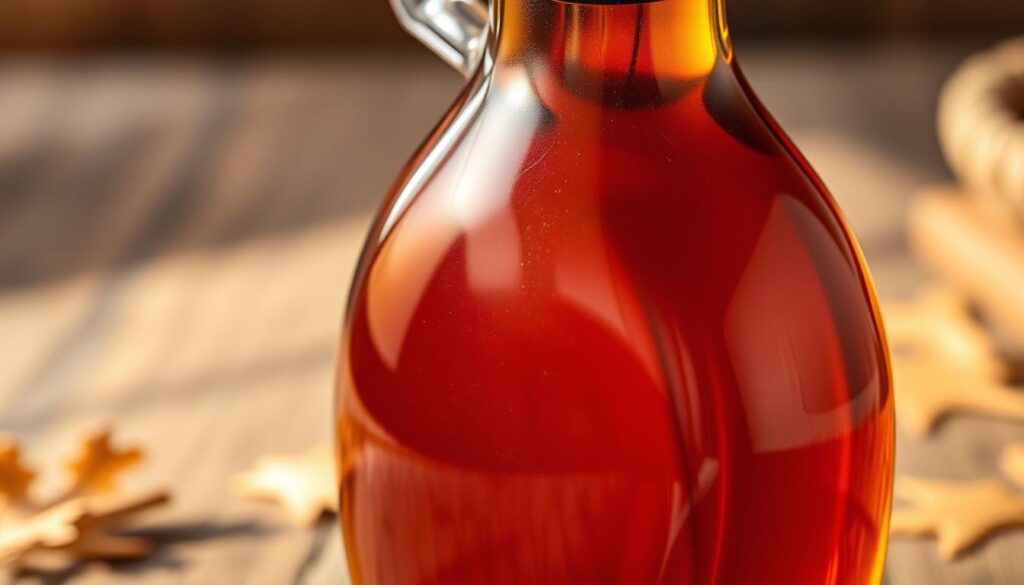
Pure maple syrup is not just sweet. It has unique nutritional benefits that make it different from processed sugars.
Nutritional Profile
Unlike refined sugars, maple syrup has essential minerals and antioxidants. A single serving gives you:
- Manganese: Supports bone health and metabolism
- Zinc: Boosts immune system function
- Calcium: Promotes strong bones and teeth
- Potassium: Helps regulate heart function
Natural vs Artificial Sweeteners
Choosing natural sweeteners like maple syrup over artificial ones has big health benefits. Pure maple syrup provides complex nutrients that synthetic sweeteners cannot match. The body processes natural sugars better, reducing metabolic stress.
Natural ingredients connect us to traditional, wholesome nutrition.
When making maple syrup recipes, pick high-quality, pure maple syrup. It’s a nutrient-rich sweetener for your treats. Its minimal processing keeps its natural goodness, making it a better choice for health-conscious people.
Seasonal Variations and Flavor Combinations
Making gourmet maple syrup treats is a fun journey when you try new flavors with the seasons. Each season brings its own special chance to make your maple syrup marshmallows truly unique. They can capture the spirit of the time of year.
In spring, the light, floral tastes of lavender or rose water pair well with maple’s deep flavor. Summer brings out citrus zest or fresh mint for a bright taste. Autumn is the time for spices like cinnamon, nutmeg, or cardamom to warm up the maple syrup.
- Spring: Lavender, Rose, Chamomile
- Summer: Lemon, Mint, Basil
- Autumn: Cinnamon, Nutmeg, Cardamom
- Winter: Vanilla, Ginger, Clove
The key to amazing maple syrup marshmallows is knowing how to mix seasonal ingredients with maple’s complex taste. Using local, seasonal ingredients can turn your homemade treats into something truly special. They become a story of time and place.
“Every season offers a unique palette of flavors waiting to be discovered in your marshmallow creation.” – Artisan Confectioner
Winter is the perfect time for bold, warm flavors. Think about adding ginger or deep vanilla to your marshmallows. It’s like bringing the cozy feel of winter into your treats. Every mix is a chance to be creative and share your own unique taste.
Making Gift-Worthy Maple Marshmallow Packages
Turning your homemade maple marshmallows into beautiful treats is all about creativity and detail. The right packaging can make these tasty sweets into gifts that people will remember.
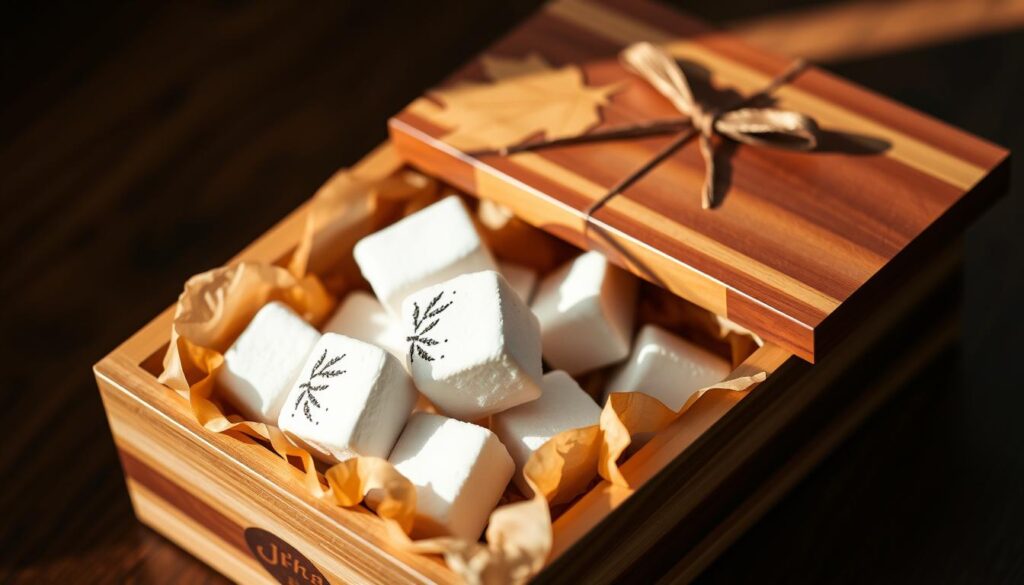
Creating a great presentation means picking materials that protect and highlight your marshmallows. They should show off their handmade quality.
Packaging Ideas for Maple Marshmallows
- Clear cellophane bags with rustic twine closures
- Vintage-inspired kraft paper boxes
- Mason jars with decorative fabric toppers
- Wooden gift crates lined with parchment paper
Presentation Tips for Gourmet Maple Syrup Treats
It’s not just about the packaging. Here are some tips to make your marshmallows stand out:
- Include a small card with the recipe or origin story
- Add a mini bottle of pure maple syrup as an accompaniment
- Use ribbons and labels that complement the marshmallows’ warm maple tones
- Create themed gift sets for different occasions
Pro tip: Layer maple marshmallows between sheets of wax paper to prevent sticking and maintain their delicate texture during transport.
Troubleshooting Your Maple Marshmallow Recipe
Making perfect maple syrup marshmallows can be tricky, even for experts. Knowing common problems helps keep your maple syrup marshmallow journey smooth and tasty.
When making maple syrup recipes, texture and consistency are key. Marshmallow makers often face several common issues that can affect the final product.
- Underwhipped batter leads to dense, soggy marshmallows
- Incorrect sugar syrup temperature affects marshmallow structure
- Humidity can impact marshmallow setting process
Getting the temperature right is key when making maple marshmallows. A professional marshmallow troubleshooting guide suggests calibrating your candy thermometer for accuracy.
| Problem | Possible Cause | Solution |
|---|---|---|
| Marshmallows won’t set | Incorrect gelatin ratio | Adjust gelatin measurement precisely |
| Sticky texture | High humidity | Reduce water in gelatin bloom |
| Grainy marshmallows | Sugar not fully dissolved | Stir syrup until completely smooth |
Pro tip: Let cut marshmallows rest on a sheet tray for a couple of hours before packaging to improve texture and stability.
By knowing these common issues, home cooks can make delightful maple syrup marshmallows. These marshmallows will be light, fluffy, and full of rich maple flavor.
Scaling the Recipe for Different Batch Sizes
Making homemade marshmallows with maple syrup needs careful attention to recipe sizes. Scaling up or down can be challenging. But, with the right steps, you can adjust your recipe for any serving size.
- Ingredient ratios are very important
- The size of your mixing equipment matters
- It’s vital to keep an eye on cooking temperatures
- The texture of your marshmallows can change with batch size
Starting with a small batch is often best for beginners. A standard recipe makes about 16-20 marshmallows. To increase the batch size, follow these tips:
- Keep the ingredient ratios the same
- Use bigger mixing bowls for larger batches
- Whip the mixture a bit longer for bigger batches
- Get a good kitchen scale for accuracy
| Batch Size | Maple Syrup (cups) | Gelatin (packets) | Estimated Marshmallows |
|---|---|---|---|
| Small | 1/2 | 2 | 16-20 |
| Medium | 1 | 4 | 32-40 |
| Large | 2 | 8 | 64-80 |
Experts suggest scaling up in small steps to keep quality high. With practice and patience, you’ll get better at making marshmallows.
Conclusion
Making maple syrup marshmallows turns simple dessert making into a fun adventure. It mixes old techniques with new flavors. This lets home bakers try out maple dessert ideas that excite their taste buds and spark their creativity.
Every batch of maple syrup marshmallows shows off a baker’s skill and love. Choosing the best maple syrup and controlling the temperature are key. These steps make each marshmallow special. Bakers who learn these techniques find a rewarding hobby that makes their sweets stand out.
Maple syrup marshmallows are not just for eating. They can be enjoyed with hot cocoa, in gourmet s’mores, or as special gifts. They open up a world of possibilities. Start experimenting, trust your taste, and let maple syrup lead your way.
At its heart, making maple marshmallows is about bringing joy and sharing sweet moments. Your kitchen becomes a place of creativity. Maple syrup is your tool, and marshmallows your masterpiece.

